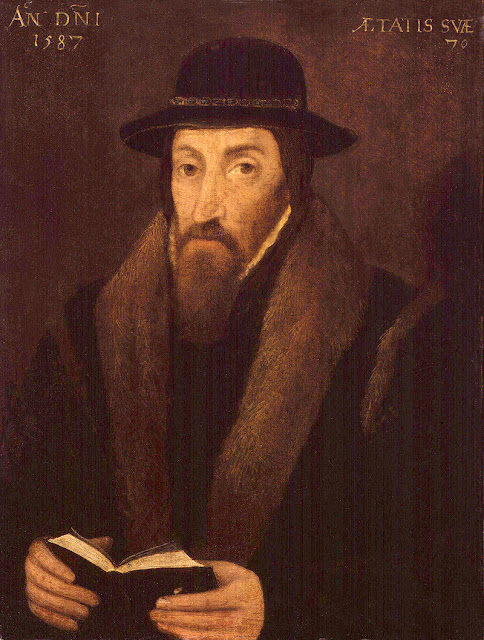 |
| John Foxe (1516 - 1587) - Wikipedia |
[Queen Mary and Lady Jane Grey]
The premature death of that celebrated young monarch, Edward the Sixth, occasioned the most extraordinary and wonderful occurrences, which had ever existed from the times of our blessed Lord and Saviour's incarnation in human shape. This melancholy event became speedily a subject of general regret. The succession to the British throne was soon made a matter of contention; and the scenes which ensued were a demonstration of the serious affliction which the kingdom was involved in. As his loss to the nation was more and more unfolded, the remembrance of his government was more and more the basis of grateful recollection. The very awful prospect, which was soon presented to the friends of Edward's administration, under the direction of his counsellors and servants, was a contemplation which the reflecting mind was compelled to regard with most alarming apprehensions. The rapid approaches which were made towards a total reversion of the proceedings of the young king's reign, denoted the advances which were thereby represented to an entire revolution in the management of public affairs both in church and state.
Alarmed for the condition in which the kingdom was likely to be involved by the king's death, an endeavour to prevent the consequences, which were but too plainly foreseen, was productive of the most serious and fatal effects. The king, in his long and lingering affliction, was induced to make a will, by which he bequeathed the English crown to lady Jane, the daughter of the duke of Suffolk, who had been married to the lord Guilford, the son of the duke of Northumberland, and was the grand-daughter of the second sister of king Henry, by Charles, duke of Suffolk. By this will, the succession of Mary and Elizabeth, his two sisters, was entirely superseded, from an apprehension of the returning system of popery; and the king's council, with the chief of the nobility, the lord-mayor of the city of London, and almost all the judges and the principal lawyers of the realm, subscribed their names to this regulation, as a sanction to the measure. Lord chief justice Hale, though a true protestant and an upright judge, alone declined to unite his name in favour of the lady Jane, because he had already signified his opinion, that Mary was entitled to assume the reins of government. Others objected to Mary's being placed on the throne, on account of their fears that she might marry a foreigner, and thereby bring the crown into considerable danger. Her partiality to popery also left little doubt on the minds of any, that she would be induced to revive the dormant interests of the pope, and change the religion which had been used both in the days of her father, king Henry, and in those of her brother Edward: for in all his time she had manifested the greatest stubbornness and inflexibility of temper, as must be obvious from her letter to the lords of the council, whereby she put in her claim to the crown, on her brother's decease.
When this happened, the nobles, who had associated to prevent Mary's succession, and had been instrumental in promoting, and, perhaps, advising the measures of Edward, speedily proceeded to proclaim lady Jane Gray, to be queen of England, in the city of London and various other populous cities of the realm. Though young, she possessed talents of a very superior nature, and her improvements under a most excellent tutor had given her many very great advantages.
Her reign was of only five days continuance, for Mary, having succeeded by false promises in obtaining the crown, speedily commenced the execution of her avowed intention of extirpating and burning every protestant. She was crowned at Westminister in the usual form, and her elevation was the signal for the commencement of the bloody persecution which followed.
Having obtained the sword of authority, she was not sparing in its exercise. The supporters of Lady Jane Gray were destined to feel its force. The duke of Northumberland was the first who experienced her savage resentment. Within a month after his confinement in the Tower, he was condemned, and brought to the scaffold, to suffer as a traitor. From his various crimes, resulting out of a sordid and inordinate ambition, he died unpitied and unlamented.
The changes, which followed with rapidity, unequivocally declared, that the queen was disaffected to the present state of religion.—Dr. Poynet was displaced to make room for Gardiner to be bishop of Winchester, to whom she also gave the important office of lord-chancellor. Dr. Ridley was dismissed from the see of London, and Bonne introduced. J. Story was put out of the bishopric of Chichester, to admit Dr. Day. J. Hooper was sent prisoner to the Fleet, and Dr. Heath put into the see of Worcester. Miles Coverdale was also excluded from Exeter, and Dr. Vesie placed in that diocess. Dr. Tonstall was also promoted to the see of Durham. "These things being marked and perceived, great heaviness and discomfort grew more and more to all good men's hearts; but to the wicked great rejoicing. They that could dissemble took no great care how the matter went; but such, whose consciences were joined with the truth, perceived already coals to be kindled, which after should be the destruction of many a true christian."
Source: https://www.gutenberg.org/files/22400/22400-h/22400-h.htm